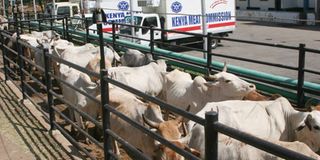Landless KMC is a dead duck

KMC was designed to play the role of buyer of last resort by accepting all animals presented to it.
What you need to know:
- Granted, DoD will wield a lot of power over KMC as its parent ministry. But ownership has not changed hands.
- There is no clear line of command.
- As a chief executive of a parastatal, you report to multiple people and entities. You have too many bosses.
- With its conflicting mandates, KMC is a dead duck.
I am yet to fully grasp the significance and the implications of the recent presidential executive order to transfer ministerial responsibility over the State-owned Kenya Meat Commission (KMC) to the Department of Defence.
With the matter having been taken to court, we can only wait and see how the High Court will interpret the legality or not of what amounts to a brazen attempt at altering a state corporation’s parent ministry by administrative fiat.
Are public assets at risk? That is debateable. But at face value, merely tinkering with the parent ministry’s status of a parastatal should not be a big deal. It is not the same thing as transferring rights over a parastatal to a private party.
Granted, DoD will wield a lot of power over KMC as its parent ministry. But ownership has not changed hands. As I see it, the National Treasury will continue to exercise ownership rights and powers over KMC, including approving its budgets.
The KMC saga is but the latest illustration of the corporate governance mess in which our parastatals find themselves. This is why accountability standards in our parastatal sector remain low.
As a chief executive of a parastatal, you report to multiple people and entities. You have too many bosses.
Under the Act of Parliament that created that parastatal, the CEO reports to, and works directly under, a board of directors. Secondly, you also report to the principal secretary and the Cabinet secretary of the parent ministry. Thirdly, you must report and seek approval and guidance from the National Treasury for any decision. The National Treasury is the legal shareholder.
Office of the President
Fourthly, under the State Corporations Act, the Office of the President can step in at any time and call in the Inspectorate of State Corporations or the Efficiency Monitoring Unit to conduct an abrupt management audit of your operations. Fifth, all state corporations must obey guidelines issued by the State Corporations Advisory Committee, domiciled under the OP.
There is no clear line of command. How do you hold a managing director of a parastatal to account under such a messy and convoluted corporate governance regime?
Worse, parent ministries still pack boards of parastatals with their representative, who sit as ex-officio directors. Which begs the question: How can a parent ministry question decisions by a board of a parastatal in which it is adequately represented. Talk of conflict of interest.
Dead duck
If you look at the change of KMC’s parent ministry against the broader context of the mess, confusion and overlaps in the running of parastatals, the inescapable conclusion is that putting the parastatal under the military is of little consequence.
With its conflicting mandates, KMC is a dead duck. First, it was designed to operate commercially and to make profits. Secondly, it was obligated to subsidise livestock farmers by providing them with a market during the dry seasons.
KMC was designed to play the role of buyer of last resort by accepting all animals presented to it. In the past, the company used to own large tracts of holding ground, where it kept and fattened huge herds of cattle, mostly delivered during drought. However, the company’s business model collapsed many years ago, mainly due to theft of its land by the political elite.
I recently came across a February 1995 letter in my archives by a former minister for agriculture and livestock development, Mr Simeon Nyachae, to then-President Daniel arap Moi, pleading for his intervention to recover thousands of acres of KMC land that had been grabbed by the Kamba political elite of the time.
Things had been looking up for KMC because its factory had just undergone a major rehabilitation funded by the Japanese company Mitsubishi Corporation.
Adequate holding grounds
I read in that letter how Nyachae informed Moi that Mitsubishi had agreed to purchase 40 per cent of canned beef from the rehabilitated plant but had expressing its fear that the deal risked being cancelled if KMC did not have adequate holding grounds for animals to be slaughtered. He stressed that the holding ground was critical as KMC was required to have facilities for animal inspection and quarantining of animals found to be in bad health.
Nyachae informed the President that KMC had also lost 3,500 acres to the Nyayo Car project.
I also saw a letter in which Mitsubishi’s local representative, a Mr M. Naguchi, also wrote expressing the view that, for KMC to be commissioned and for it to pass the European veterinary standards for overseas markets, it needed a minimum of 3,500 acres with a permanent source of water.
The point is this: KMC is in the parlous state it is in because its land was stolen by corrupt elites. With the land gone, the business model was ruined, probably permanently. No amount of money pumped into the company will bring back the lucrative export markets it used to have.





